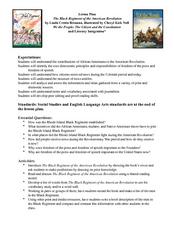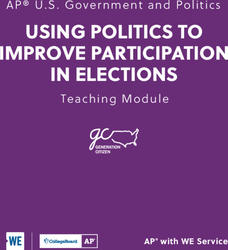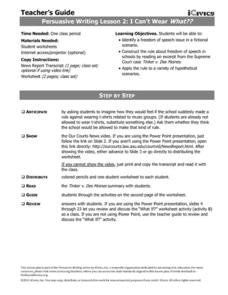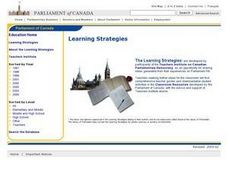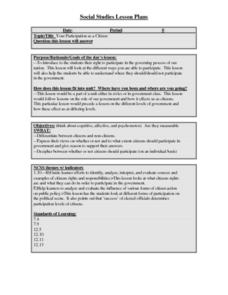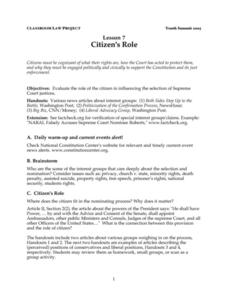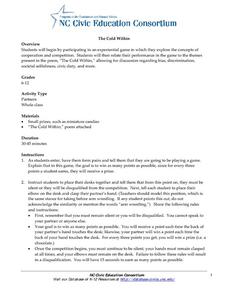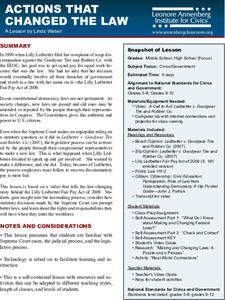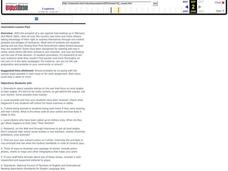Curated OER
We the People: The Citizen and the Constitution: The American Revolution
The contributions of African-Americans to the American Revolution are the focus of this Social Studies and language arts activity. After reading and discussing Linda Crotta Brennan’s The Black Regiment of the American Revolution, class...
Facing History and Ourselves
The Audacity of a Vote: Susan B. Anthony’s Arrest
Susan B. Anthony's speech "Is It a Crime for Women to Vote?" takes center stage in a lesson that asks class members to consider how they might respond to what they consider an unjust law. Groups work through the speech paragraph by...
College Board
Using Politics to Improve Participation in Elections
Instructors new to teaching AP U.S. Government and Politics classes, as well as seasoned veterans, will find this teaching guide an invaluable resource. Using a project-based approach to civics education, the lessons emphasize real-world...
iCivics
I Can’t Wear What?
Can schools ban t-shirts picturing musical groups or bands? Your young citizens will find out with this resource, which includes a summary of a United States Supreme Court case from the 1960s about a similar dispute over students wearing...
Curated OER
I am a Hero for Animals!
Students explore the humane treatment of animals. In this character development and civic responsibility lesson, students define "hero" and brainstorm related attributes. Students complete an action plan using the "rational approach"...
Curated OER
Your Participation as a Citizen
Students investigate their right to participate in the governing process of our nation. They look ast the different ways they are able to participate. They define citizenship, and decipher between whether or not citizens should...
Curated OER
Citizen's Role
Students discuss the role of citizens in the United States. In groups, they evaluate how the role of citizens is important when selecting Supreme Court Justices. They read articles about internest groups and complete worksheets to end...
Curated OER
How Laws Are Made
Students create a graphic organizer to illustrate the steps elected representatives must take to make a new law. Included: Student work sheet and role-play ideas. Students use their graphic organizers to write a paragraph briefly...
Center for Civic Education
What Is Authority?
Young scholars examine the concepts of power and authority as they begin learning about government in this elementary social studies lesson. Through a series of readings, discussions, and problem solving activities, children...
Curated OER
Acting for the Common Goods
The first of a three-part series on bullying, this plan has class members present skits about bullying, write and sign an anti-bullying pledge, and complete a service project. For the skit, learners use information from previous lessons...
Judicial Branch of California
Where We Fit In: The Judicial Branch
An interesting resource addresses the role of youth in civic participation and community events. It also explains the role of the justice system in creating boundaries and how citizens play a part in the judicial process. Pupils...
Franklin D. Roosevelt Presidential Library & Museum
Role Playing Relating to Big Decisions
While most high schoolers are too young to vote, they still need to learn the skills needed to solve problems. The ninth resource in a 10-part civics series presents class members with four "What Would You Do?" scenarios that have them...
Carolina K-12
The Cold Within
“. . . one of the great challenges to humanity is acknowledging and overcoming a natural tendency to think less of and discriminate against people who are different from us . . .” Launch an examination of competition and cooperation, of...
Curated OER
Campaign Ad Critique
Students analyze current campaign TV ads and literature. They identify the ad by "type." They learn to look beyond the ad to understand its intended purposes and its real content.
Carolina K-12
Advocacy 101
Want a change? Become an advocate. As part of a study of the responsibilities of good citizens, class members engage in a series of role plays that model how to lobby for change.
Annenberg Foundation
Actions that Changed the Law
The Fair Play Act of 2009 came about due to the actions of one woman. Young historians research Lilly Ledbetter and what she went through to get pay equal to that paid to men for the same work at Goodyear Tire and Rubber Company. The...
Curated OER
Action Through Art
How can we make the world a better place? Help your class members become world citizens, active in philanthropy and the community around them. Use a comic book (included) to discuss the idea of philanthropy. Then, using the superhero...
Annenberg Foundation
Service Learning in the Social Studies
Active Citizenship Today (ACT) is a "unique social studies service learning program" that requires students to learn about the public policy associated with community issues they identify in their local community. This web site...
Curated OER
RBG Dr. Martin Luther Jr. Studies Lesson Plan-Guide
Explore Martin Luther King Jr. Young scholars listen to a speech given by Martin Luther King, and interpret his message. They discuss civil rights and how Martin Luther King Jr. exhibited good citizenship, then brainstorm ways in...
Curated OER
Speaking Out Against War
Students discuss the affect the Iraq War has had on citizens taking advantage of their right to express themselves through non-violent protests and pledges of resistance. They research and discuss local community and school events and...
Curated OER
Creating Civic Awareness Through Artistic and Literary Forms
Interpret current events using editorial cartoons and other print media. Middle schoolers explore the meanings of literary and artistic terms such as satire, irony, and caricature. They visit internet sites to develop an understanding of...
Delaware Law Related Education Center
Comparing Personal and Civil Responsibility in Croatia and The United States
What rights do citizens in a democracy have? Learners compare the rights of citizens in the United States and Croatia, and examine the personal and civil responsibilities that go along with those rights through a great series...
Curated OER
What is Democracy?
Students explore the facets of democracy. In this civic responsibility lesson, students create a definition of democracy and discuss the difference between a spectator and a participatory citizen. Students discuss whose responsibility...
